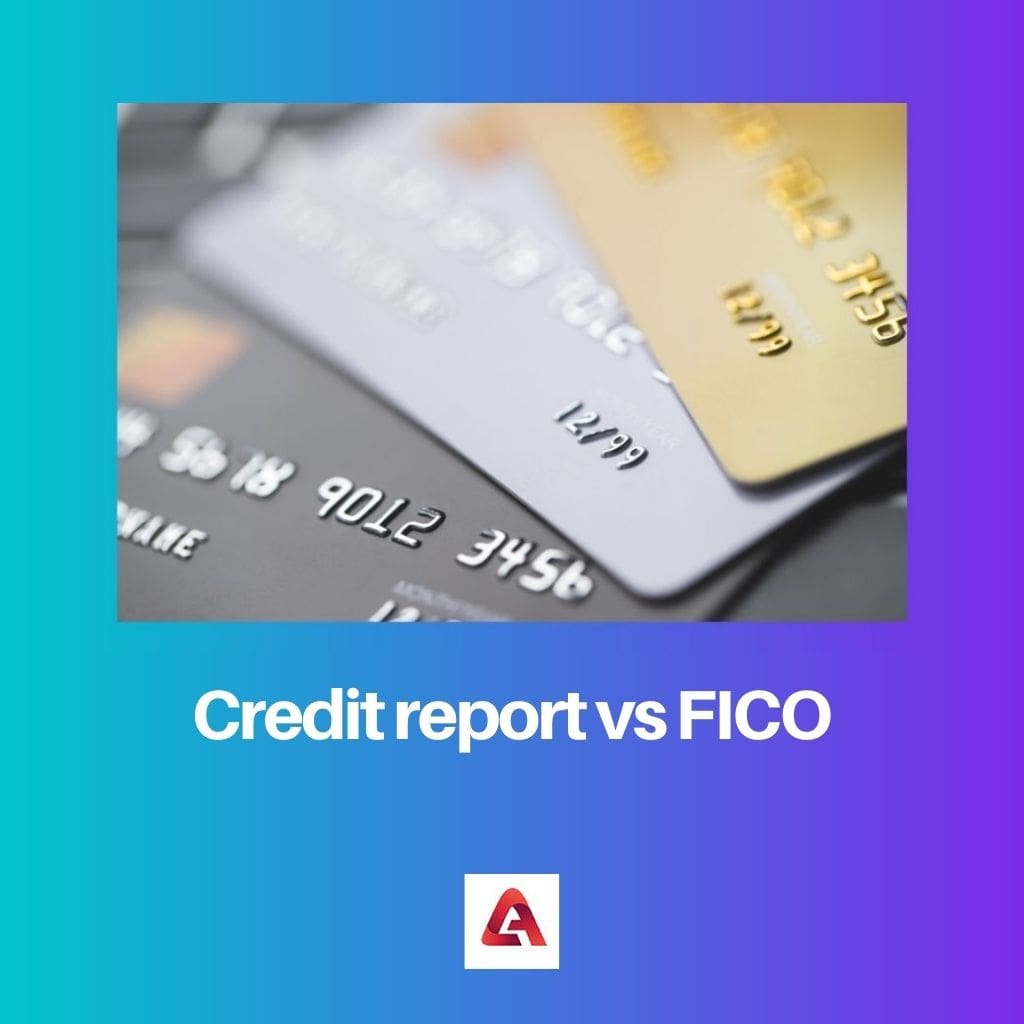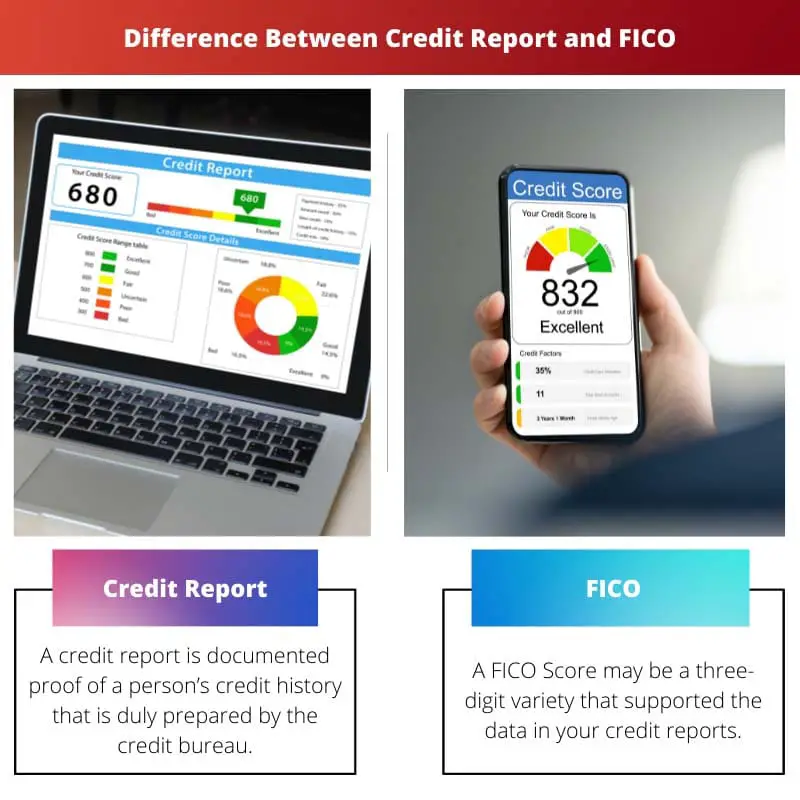A credit report is a detailed record of an individual’s credit history, including accounts, payment history, and inquiries, provided by credit bureaus. FICO score, on the other hand, is a numerical representation of creditworthiness calculated based on data from credit reports, aiding lenders in assessing risk when extending credit to individuals.
Key Takeaways
- Credit reports provide detailed information on an individual’s credit history; FICO scores are numerical creditworthiness ratings.
- Credit reports are generated by credit bureaus like Experian, Equifax, and TransUnion; FICO scores are calculated by the Fair Isaac Corporation using data from credit reports.
- Credit reports can help identify errors or potential identity theft; lenders use FICO scores to evaluate loan applications and credit risk.
Credit Report vs FICO
The difference between a Credit report and a FICO score is the credit pattern analysis and assigning a score depending on the pattern. A credit report has a detailed analysis of a customer’s credit pattern, starting with the date of avail of the credit and the final repayment. At the same time, FICO offers a score based on the creditworthiness of any individual.

Comparison Table
| Feature | Credit Report | FICO Score |
|---|---|---|
| Type of Information | Detailed record of your credit history | Numerical representation of your creditworthiness |
| Content | Payment history, credit utilization, types of credit, length of credit history, public records, inquiries | Scores from 300 to 850, with higher scores indicating better creditworthiness |
| Purpose | To provide a comprehensive overview of your credit history to lenders and other entities | To help lenders assess your creditworthiness and risk of defaulting on a loan |
| Issued by | Credit bureaus (e.g., Experian, Equifax, TransUnion) | FICO (Fair Isaac Corporation) |
| Frequency of Updates | Updated monthly | Updated monthly, but lenders typically use the score they receive at the time of application |
| Cost to Access | You can get one free report from each credit bureau annually, but additional reports may have a fee | Varies depending on the provider, but there can be fees associated with checking your FICO score |
| Impact on Credit Score | Errors in your report can negatively impact your score | Checking your FICO score (soft inquiry) does not affect your score, but applying for credit (hard inquiry) can temporarily lower your score |
What is Credit Report?
Introduction to Credit Report
A credit report is a crucial financial document that provides a comprehensive overview of an individual’s credit history and financial behavior. It serves as a vital tool for lenders, creditors, landlords, and even potential employers to assess an individual’s creditworthiness and financial responsibility. Understanding the components and significance of a credit report is essential for managing personal finances effectively.
Components of a Credit Report
1. Personal Information
This section of the credit report includes personal identifying information such as the individual’s name, address, Social Security number, date of birth, and sometimes employment history. Accuracy in this section is critical, as any discrepancies or errors could potentially impact credit decisions.
2. Account Information
The account information section comprises details about the individual’s credit accounts, including credit cards, loans, mortgages, and lines of credit. It provides a comprehensive overview of each account, including the creditor’s name, account number, type of account, current balance, credit limit or loan amount, payment history, and account status (e.g., open, closed, in collections).
3. Payment History
The payment history section is one of the most critical components of a credit report. It outlines the individual’s repayment behavior, including whether payments were made on time, any late payments, delinquencies, defaults, or accounts in collections. Timely payments contribute positively to one’s credit score, while late payments and defaults can have adverse effects.
4. Public Records and Collections
This section includes any public records associated with the individual’s financial history, such as bankruptcies, foreclosures, tax liens, and civil judgments. Additionally, it may list accounts that have been sent to collections due to non-payment.
Significance of Credit Report
A credit report plays a significant role in various financial transactions, influencing decisions related to obtaining credit cards, loans, mortgages, renting an apartment, purchasing insurance, and even securing employment. Maintaining a positive credit history by making timely payments and managing credit responsibly is essential for achieving financial goals and accessing favorable credit terms and interest rates. Regularly reviewing one’s credit report for accuracy and addressing any discrepancies or errors is crucial for maintaining financial health and ensuring access to credit when needed.

What is FICO?
Introduction to FICO Score
The FICO score, developed by the Fair Isaac Corporation, is a widely used credit scoring model designed to assess an individual’s creditworthiness based on their credit history. FICO scores are utilized by lenders, creditors, landlords, and other financial institutions to evaluate the risk associated with extending credit or offering financial products to consumers. Understanding the intricacies of the FICO scoring system is crucial for individuals seeking to manage their credit effectively and access favorable loan terms.
Components of FICO Score
1. Payment History
Payment history is the most influential factor in determining a FICO score, constituting approximately 35% of the overall score. It assesses an individual’s track record of making timely payments on credit accounts, including credit cards, loans, and mortgages. Consistently paying bills on time contributes positively to the FICO score, while late payments, defaults, and accounts in collections can have adverse effects.
2. Amounts Owed
The amounts owed, or credit utilization, accounts for about 30% of the FICO score. This factor evaluates the ratio of credit balances to credit limits across all accounts and individual account types. Maintaining low credit card balances relative to credit limits demonstrates responsible credit management and positively impacts the FICO score, whereas high utilization ratios may indicate financial strain and could lower the score.
3. Length of Credit History
The length of credit history comprises approximately 15% of the FICO score and assesses the duration of an individual’s credit accounts. A longer credit history demonstrates stability and reliability in managing credit over time, which can positively influence the FICO score. Closing old accounts or opening numerous new accounts within a short period may shorten the credit history and potentially lower the score.
4. Credit Mix and New Credit
Credit mix and new credit collectively account for the remaining 20% of the FICO score. Credit mix evaluates the diversity of credit accounts, including credit cards, installment loans, and mortgages. Maintaining a healthy mix of credit types can positively impact the FICO score. New credit considers recent credit inquiries and account openings, with multiple inquiries or new accounts within a short timeframe potentially indicating higher risk and impacting the score negatively.
Significance of FICO Score
The FICO score serves as a critical tool for lenders and financial institutions to assess an individual’s creditworthiness and make informed decisions regarding lending and credit terms. A high FICO score indicates a lower credit risk, leading to access to better loan terms, lower interest rates, and higher credit limits. Conversely, a low FICO score may result in higher interest rates, limited credit options, and difficulty obtaining loans or credit approvals. Understanding the factors that influence the FICO score and taking proactive steps to maintain a positive credit profile are essential for achieving financial goals and securing favorable credit opportunities. Regularly monitoring one’s FICO score and addressing any negative factors can help individuals improve their creditworthiness over time.

Main Differences Between Credit Reports and FICO
- Credit Report:
- Provides a detailed record of an individual’s credit history, including accounts, payment history, inquiries, and public records such as bankruptcies or liens.
- FICO Score:
- Calculates a numerical representation of creditworthiness based on data from credit reports, emphasizing factors like payment history, credit utilization, length of credit history, new credit, and credit mix.

- https://mpra.ub.uni-muenchen.de/47783/1/MPRA_paper_47783.pdf
- https://www.federalreserve.gov/pubs/Bulletin/2004/summer04_credit.pdf

The ironical tone of this article adds a layer of humor to the complexities of credit reporting.
It’s true, the irony intertwined in the article’s tone makes the subject more approachable for readers.
Although satirical at times, the article successfully conveys a comprehensive understanding of credit reporting and FICO scoring.
The blend of satire and informative content is quite intriguing, making the article an intriguing read.
The in-depth nature of this article can be overwhelming, yet it’s a goldmine of information for those wanting to understand credit and FICO.
I understand the sentiment. It’s a lot to unpack, but for those willing to spend time, it’s worth the read.
I appreciate how comprehensive the information is. It’s great to have a solid understanding of credit reports and FICO scores.
Absolutely! The in-depth explanation is beneficial for anyone looking to gain insight into the credit system.
This article gives a highly detailed report on the credit system as it stands in most countries. The distinctions between a credit report and FICO score were presented well.
I totally agree with you, the article certainly provides complete details on credit reports and FICO scores. It’s definitely insightful!
The article provides an insightful argument that credit reports and FICO scores are critical components in today’s financial landscape.
Absolutely, the article presents a strong rationale for the significance of understanding credit reporting and scoring mechanisms.
The detailed breakdown of credit reports and FICO scores is greatly informative.
This article is an essential resource for those seeking to expand their knowledge on credit reporting and FICO scoring.
I couldn’t agree more. It’s an intellectual piece that offers valuable information to readers.
This article makes a compelling argument for understanding the intricate details of credit reports and FICO scores.
Agreed, the detailed insights make a strong case for further examination of the credit reporting and scoring processes.
Indeed, the depth of the information provides a solid foundation for comprehending the complexities of credit systems.
This article seems confusing to me. The details are too complex, and the comparison table adds to the confusion.
I understand where you’re coming from, the complexity of the content could be overwhelming for some readers.